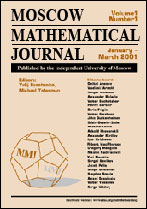|
This article is cited in 1 scientific paper (total in 1 paper)
On products of skew rotations
M. D. Arnoldab, E. I. Dinaburgac, G. B. Dobrushinaa, S. A. Pirogova, A. N. Rybkoa
a Institute for Information Transmission Problems of the Russian Academy of Sciences (Kharkevich Institute), Bolshoi Karetny per. 19, Moscow, 127994, Russia
b International Institute of Earthquake Prediction Theory and Mathematical Geophysics of the Russian Academy of Sciences, Profsoyuznaya str., 84/32, Moscow, 117997, Russia
c Schmidt Institute of Physics of the Earth of the Russian Academy of Sciences, B. Gruzinskaya str., 10, Moscow, 123995, Russia
Abstract:
Let $\{S_1^t\},\ldots,\{S_n^t\}$ be the one-parametric groups of shifts along the orbits of Hamiltonian systems generated by time-independent Hamiltonians $H_1,\ldots, H_n$ with one degree of freedom. In some problems of population genetics there appear planar transformations having the form $S^{h_n}_n\cdots S_1^{h_1}$ under some conditions on Hamiltonians $H_1,\ldots,H_n$. In this paper we study asymptotical properties of trajectories of such transformations. We show that under classical non-degeneracy condition on the Hamiltonians the trajectories stay in the invariant annuli for generic combinations of lengths $h_1,\dots, h_n$, while for the special case $h_1+\dots+h_n=0$ there exists a trajectory escaping to infinity.
Key words and phrases:
KAM theory, Hamiltonian systems.
Received: July 13, 2011
Citation:
M. D. Arnold, E. I. Dinaburg, G. B. Dobrushina, S. A. Pirogov, A. N. Rybko, “On products of skew rotations”, Mosc. Math. J., 12:4 (2012), 705–717
Linking options:
https://www.mathnet.ru/eng/mmj477 https://www.mathnet.ru/eng/mmj/v12/i4/p705
|

| Statistics & downloads: |
| Abstract page: | 258 | | Full-text PDF : | 1 | | References: | 74 | | First page: | 5 |
|




 Contact us:
Contact us: Terms of Use
Terms of Use
 Registration to the website
Registration to the website Logotypes
Logotypes








 Citation in format
Citation in format 
